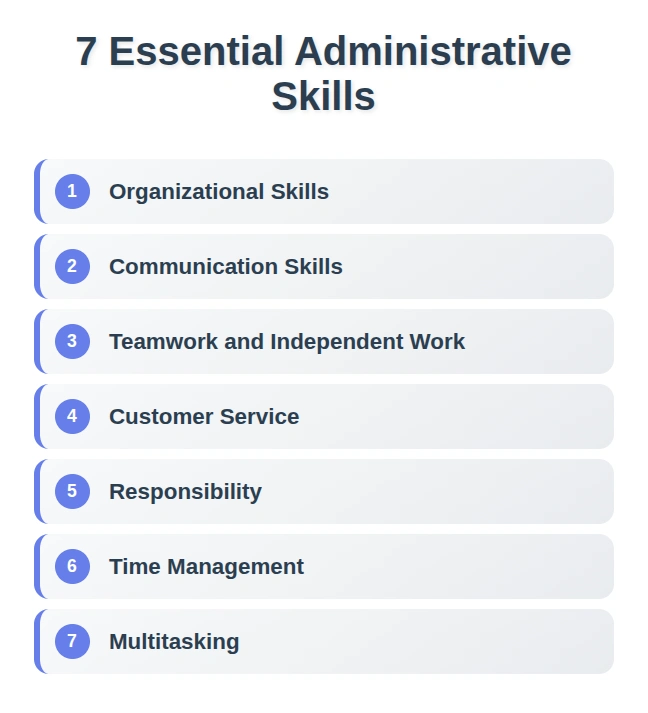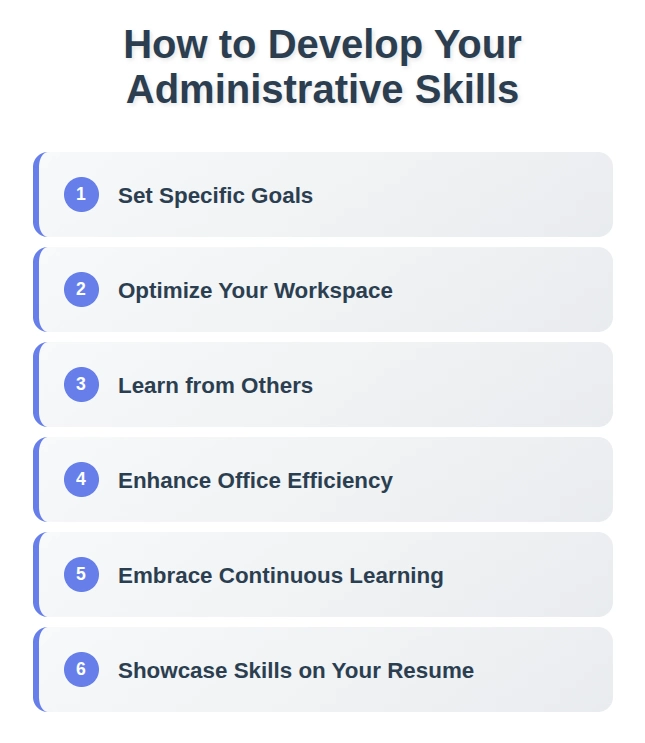What are Administrative Skills?
Administrative skills are the ability to manage and organize tasks, resources and people within an organization. They ensure smooth operations and support overall business goals. You use these skills to plan, coordinate, document and communicate effectively so an organization can run smoothly.
Why Administrative Skills are Important
Administrative skills ensure your organization operates effectively. They help achieve business objectives and goals. Professionals with strong administrative skills drive smooth daily operations. While technical knowledge is important, administrative expertise adds a critical layer of efficiency. You use these skills to improve processes and support your team.
7 Essential Administrative Skills
Here are seven essential administrative skills:

1. Organizational Skills
You use organizational skills to manage your time and resources effectively. This helps you achieve goals. These skills include:
- Time Management: Prioritize tasks and plan your work.
- Physical Space: Keep your desk clutter-free. A clean space improves your focus.
- Digital Workspace: Label all important files clearly. This saves time when you need information.
- Planning Tools: Use a calendar and reminder system. This helps you track and prioritize tasks.
When you plan tasks, allot specific time for each. Being organized helps you document information better and achieve your objectives.
2. Communication Skills
Communication skills are vital for any role, including administrative tasks. They help you work efficiently. Strong communication allows you to listen to your team and understand their needs. You solve challenges by listening carefully. These skills also help you answer customer and employee questions, providing excellent service.
Communication includes:
- Written Skills: Use these for documentation.
- Oral Skills: These are important when you explain information or respond to requests.
Free Online Communication Skills Course
Learn the essentials of effective communication. Master skills like email writing, report structuring, and tailor communication strategies to enhance your professional communication.
3. Teamwork and Independent Work
You need both teamwork and independent work skills.
Teamwork:
Collaboration helps you achieve organizational goals. Administrative roles often involve documenting processes. Detailed process documents benefit from varied perspectives. This creates effective, efficient processes and boosts productivity. Good teamwork requires strong communication and respect for teammates' opinions.
Independent Work:
Sometimes, too many opinions create confusion. Excessive discussion on certain information can waste time. In these cases, you work alone to meet goals quickly. You also work independently to make document corrections instead of brainstorming every detail.
4. Customer Service
Attracting and keeping customers is vital for any business. Good customer service leads to customer retention. When you listen to customers and solve their problems, you retain them. Administrative experience helps you identify customer pain points. You then solve these problems. Customer service is key for an administrator. You must develop strong communication skills to help customers with their tasks.
Also Read: Ways to Increase Your Communication Skills
5. Responsibility
Administrative tasks demand high responsibility. You must complete tasks on time and with quality. As an administrator, you manage crucial documentation. You are responsible for achieving goals systematically. Taking responsibility for tasks saves time by reducing corrections. You also handle complaints and opinions. Providing solutions is a key part of this responsibility.
6. Time Management
Time management skills are crucial for administrators. Your role helps ensure smooth daily operations. When you organize and prioritize tasks, you meet goals effectively. Efficient planning and clear task communication save time by reducing questions. Administrative work can be stressful. Therefore, combine time management with stress management skills.
Also Read: 14 Principles of Management
7. Multitasking
As an administrator, you often multitask. You reply to calls and emails, answer queries, check documentation, and meet deadlines. You also handle various requests and meet team needs. Strong multitasking skills save you time. They boost your productivity and reduce procrastination.
How to Develop Your Administrative Skills
You can actively improve your administrative abilities. Here are practical steps:

1. Set Specific Goals
Define clear, attainable goals for each administrative skill. For example, to save time, set a timer for specific tasks. Identify which tasks take more or less time. Learn how to complete them efficiently within set limits.
2. Optimize Your Workspace
Get organized in your physical and digital environments.
- Physical Desk: Clear unnecessary items.
- Digital Files: Label all files clearly. Follow a consistent naming pattern. This ensures easy access to information.
3. Learn from Others
Observe highly effective administrators around you. Notice what boosts their productivity. Integrate their successful routines into your own work habits.
4. Enhance Office Efficiency
Implement small changes to improve your office environment:
- Color-Code Calendars: Use colors to highlight high-priority tasks and team responsibilities.
- Pre-Meeting Prep: Plan activities before meetings. This saves time during the discussion.
- Prepare FAQs: Create a list of frequently asked questions. This reduces time spent solving simple doubts.
5. Embrace Continuous Learning
Administrative roles evolve. Continuously seek training in communication, customer service, and scheduling. Focus on improving office efficiency and overall productivity. For example, take notes during a call instead of after. This saves time and reduces errors.
6. Showcase Skills on Your Resume
When applying for roles, highlight your administrative abilities:
- Time & People Management: Detail projects where you managed tasks and met deadlines.
- Workflow & Productivity: Describe your experience in establishing workflows and monitoring team productivity.
- Communication: Mention your involvement in college committees if you answered calls or managed budgets. This demonstrates written and oral communication.
- Technical Proficiency: Showcase your efficiency in tools like customer management systems (CMS), database management and Microsoft Office applications.
Even without extensive administrative experience, show you are willing to learn. Pay attention to details that will be useful in the future. Learn from executives and managers you work with diligently.
Also Read: Management Interview Questions and Answers
Conclusion
Administrative skills are the backbone of any organization. You can build these skills through focused practice in areas like organization, communication and time management. Become an indispensable asset. Start implementing these today to boost your career.
Also Read:






